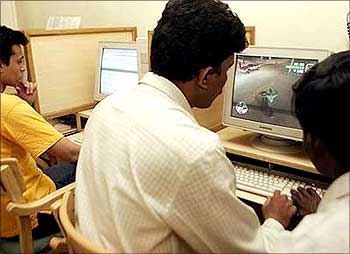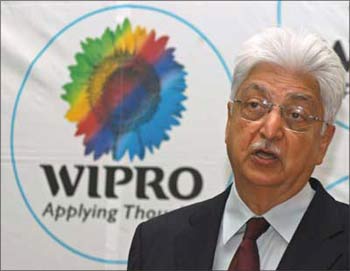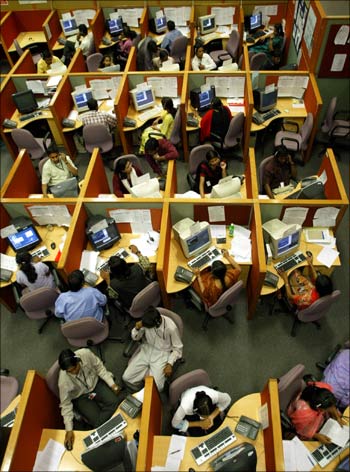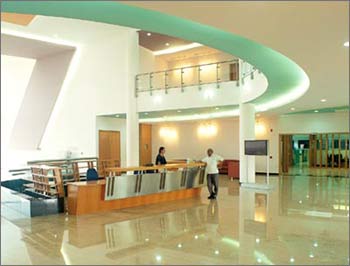Indrani Roy Mitra in Kolkata
For the second time in as many years there is no 'Puja bonanza' for the young crop of job seekers in West Bengal.
Last year, on October 3, just a few days before the Durga Puja, Tata Group chairman Ratan Tata announced that he had decided to pull the Nano car project out of Bengal following the trouble over land at Singur where the prestigious project was to come up.
And again, just a few weeks before Puja, the West Bengal government has announced the scrapping of the ambitious information technology township plan at Rajarhat in Greater Kolkata.
After the Nano project shifted to Sanand in Gujarat, following sustained protests launched by Trinamool Congress leader Mamata Banerjee, people of the state were lamenting the dwindling state of Bengal's employment-generation prospects.
Even as people were trying to recover from the loss of the Nano project, the scrapping of the IT project has come as a big shock.
What impact will this decision have on Bengal's industrialisation? Will it spell the end of the IT party for the state? What effect will it have on other IT companies in the Rajarhat area? Read on...
Why Bengal scrapped a major IT project
Image: Infosys' Mysore campusPhotographs: Rediff Archives
IT township: A brief outline
In April 2008, the West Bengal IT department had entered into an agreement with Akash Nirman Private Limited, a consortium of a number of businessmen, in which Vedic Village Resorts Company was a major stakeholder.
According to the agreement the said company was to procure land to the tune of 1,600 acres in an area adjacent to Rajarhat New Town. From that, it was supposed to hand over 600 acres to the state IT department free of cost.
In return, the IT department was supposed to bear the cost of developing and providing infrastructure. At that time state IT Minister Debesh Das had said that the government was examining the documents related to the ownership and thus had not taken possession of any land.
The same year the state government signed separate memoranda of understanding with IT majors Wipro and Infosys and promised to hand over 90 acres of land to each of them. The representatives of both these companies had met Chief Minister Buddhadeb Bhattacharjee to seal the deal.
On May 27, 2009, Webel, the nodal agency for state IT department, provided the details of the acquired land to Infosys which in turn informed the Bengal government that even though it was keen to set shop in the state it preferred to go slow in view of the global economic slowdown.
As signs of an economic revival brightened in the second quarter, state IT Minister Debesh Das announced that the government would hand over the land to the IT companies by December.
And it is then that the Vedic Village land scam came to light and all ambitious plans of the state government to build an IT township on the eastern fringes of Kolkata fell flat.
On August 29, Raj Modi, managing director of Vedic Realty (also a director in Webel Akash Nirman IT Link), was arrested on charges of having acquired land illegally.
He is now in police custody and the government now wants nothing to do with him or land acquired by him.
Why Bengal scrapped a major IT project
Image: Azim Premji, chairman of Wipro Ltd.Photographs: Jagadeesh Nv/Reuters
The IT Township: From start to finish
Here is the timeline:
- February 28, 2008: Cabinet Standing Committee on industry approves the project
- April 03, 2008: IT department inks MoUs with Infosys and Wipro for 90 acres apiece
- April 17, 2008 State Cabinet approves project
- April 24, 2008: IT department, Infosys and Wipro make joint announcement
- September 26, 2008: Joint sector company Webel Akash IT Links Pvt Ltd formed
- January 27, 2009: Urban development department gets notification of project area ratified in Cabinet
- May 27, 2009: Webel provides details of 90 acres to Infosys
- August 23, 2009: A resort, Vedic Village, in the outskirts of Kolkata, set ablaze. Vedic Realty managing director Raj Modi under lens for shady land deals
- August 29, 2009: Raj Modi arrested
- September 01, 2009: IT Township land mutation stalled
- September 07, 2009: Bengal government scraps the project
Why Bengal scrapped a major IT project
Image: Farmers walk through a field at Moynaguri village, about 66 km north of Siliguri.Photographs: Rupak De Chowdhuri/Reuters
Vedic Village arson exposed land scam
It actually took a football match to bring the land scam to light.
On August 23, an armed mob entered Vedic Village, a resort built on 44 acres of land near Rajarhat New Town, and set it on fire destroying almost 70 per cent of it.
They were mostly local villagers who were provoked into doing this after Gaffar Mollah attacked and disrupted a local football tournament with bombs and weapons and then took shelter in the resort. One person was killed and several were seriously injured in the attack.
The angry villagers attacked the resort where Gaffar -- who has been said to be involved in land grab -- was hiding.
Even though Das had always maintained that 'the entire deal was cleared by the state Cabinet,' apparently most ministers were in the dark about the land deal.
Khsiti Goswami, the PWD minister and leader of RSP (a partner in the ruling Left Front government), said that the chief minister had once informed the Cabinet that there had been a surge of demand for land in the IT sector in Salt Lake-Rajarhat New Town area.
But since there was no land available in that area, the government had decided to look for land in the adjacent areas to accommodate IT giants like Infosys and Wipro, who would not only generate employment in West Bengal but also add much-needed gloss to the state's intentions of becoming an IT powerhouse.
Gautam Deb, minister in charge of department of housing, said that the government must find out about the deal between Vedic Village and the IT sector, and demanded to know who in the government were responsible for granting land to Vedic Village ignoring the Land Acquisition Act, 1894.
Why Bengal scrapped a major IT project
Image: Indian employees seated in their cubicles at a call centre.Photographs: Sherwin Crasto/Reuters
Bengal stands to lose about Rs 100 billion, 300,000 jobs
West Bengal stands to lose a mammoth Rs 10,000 crore (Rs 100 billion) of potential IT investments and creation of 300,000 jobs in the IT-ITeS sector.
At present, nearly 100,000 people work in West Bengal's IT sector, with about 80,000 in Kolkata's Salt Lake Sector V IT hub alone.
According to Left Front insiders, the scrapping of IT township will have a long-term effect and is bound to impact the IT companies' expansion and investment plans in Bengal.
"The Nano project had portrayed the state as a troubled one. The IT township fiasco just sealed that conviction. If I were an IT major, I would think twice before making further investment in the state," a veteran Communist Party of India-Marxist loyalist told rediff.com.
Why Bengal scrapped a major IT project
Image: The lobby of Infosys's development centre in Mysore.Photographs: Courtesy, Infosys Technologies
A sad day for West Bengal: Infosys
T V Mohandas Pai, member of the board and director-human resources, Infosys Technologies, said on September 7, 2009 that the West Bengal government's decision to scrap the proposed IT hub project was 'sad'.
"It is a very sad day for West Bengal. The projects in the IT hub would have generated large number of jobs for the educated middle class youth of the state," Pai told Chabbish Ghonta, a regional news channel.
Terming the decision by the state government as 'totally not the right thing to do', Pai said the project could have generated 50,000-100,000 jobs.
"The government should take the pivotal role in land acquisition for any important project," Pai said.
Asked whether he is hopeful of returning to the state later, Pai said: "No, I am not hopeful of returning to the state."
Why Bengal scrapped a major IT project
Image: Mamata Banerjee.Photographs: Jayanta Shaw/Reuters
Opposition slams the Left Front government
Interestingly, doing a complete U-turn from her Nano factory stance, Union Railway Minister Mamata Banerjee is singing an 'industrialisation tune' this time.
In a meeting at Rajarhat on September 8, she not only demanded new land be given to Wipro and Infosys but also said that the Vedic Village violence probe should be handed over to the Central Bureau of Investigation.
West Bengal's Land Reforms Minister Abdur Rezzak Mollah had recently demanded that the project be scrapped after irregularities related to land acquisition came to light.
State Congress leader Manas Bhuniya, too lamented that youths of Bengal could not be a party to the countrywide IT boom. "This decision to scrap the project will again push back West Bengal in industrialisation. Thousands of young people of our state will ultimately suffer due to this decision," Bhuniya had told the media.
Holding West Bengal Chief Minister Buddhadeb Bhattacharjee responsible for the 'mess', he demanded a Central Bureau of Investigation probe into the Vedic Village land controversy.
Land acquistion woes have become a bane for West Bengal, bringing into sharp focus the fact that the state government's steps to acquire land for industrialisation are not exactly prudent: they not only rob the state of much-needed investments but also of precious jobs.








article